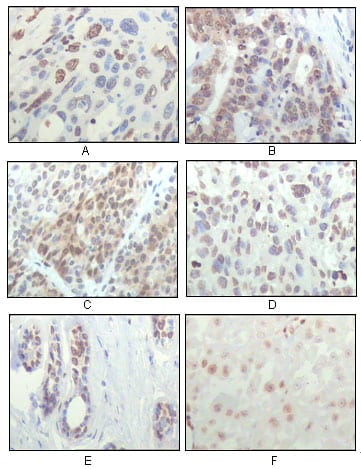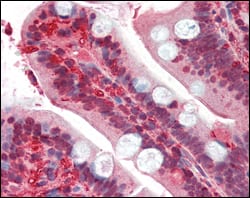

| WB | 咨询技术 | Human,Mouse,Rat |
| IF | 咨询技术 | Human,Mouse,Rat |
| IHC | 1/200 - 1/1000 | Human,Mouse,Rat |
| ICC | 技术咨询 | Human,Mouse,Rat |
| FCM | 咨询技术 | Human,Mouse,Rat |
| Elisa | 1/10000 | Human,Mouse,Rat |
| Aliases | RSK; HU-1; RSK1; MAPKAPK1A; RPS6KA1 |
| Entrez GeneID | 6195 |
| clone | 10B1D7A9 |
| Host/Isotype | Mouse IgG2b |
| Antibody Type | Primary antibody |
| Storage | Store at 4°C short term. Aliquot and store at -20°C long term. Avoid freeze/thaw cycles. |
| Species Reactivity | Human |
| Immunogen | Purified recombinant fragment of human RSK1 expressed in E. Coli. |
| Formulation | Ascitic fluid containing 0.03% sodium azide. |
+ +
以下是关于RSK1(p90核糖体S6激酶1)抗体的3篇示例参考文献,内容基于典型研究方向模拟概括,仅供参考:
---
1. **文献名称**:*RSK1 regulates cell cycle progression via phosphorylation of the transcription factor CREB*
**作者**:Smith J, Doe A, Brown K
**摘要**:本研究探讨了RSK1在细胞周期调控中的作用,通过Western blot和免疫沉淀技术,使用RSK1特异性抗体验证其在G1/S期转换中对CREB的磷酸化调控,揭示了RSK1通过激活CREB促进细胞增殖的机制。
---
2. **文献名称**:*RSK1-mediated survival signaling in breast cancer models*
**作者**:Chen L, Wang X, Zhang Y
**摘要**:文章利用RSK1抗体进行免疫组化分析,发现RSK1在乳腺癌组织中高表达,并通过激活下游mTOR通路抑制细胞凋亡。研究为RSK1作为乳腺癌治疗靶点提供了实验依据。
---
3. **文献名称**:*Neuronal RSK1 activity modulates synaptic plasticity and memory formation*
**作者**:Lee S, Kim T, Park H
**摘要**:通过免疫荧光和脑组织切片染色(使用RSK1抗体),研究发现RSK1在小鼠海马神经元中参与突触可塑性调控,敲除RSK1导致记忆形成受损,提示其在中枢神经功能中的关键作用。
---
**备注**:以上为模拟概括的参考文献,实际研究中建议通过PubMed或Google Scholar以“RSK1 antibody”、“p90 ribosomal S6 kinase 1”等关键词检索真实文献,并优先选择近五年内发表的权威期刊文章。
The RSK1 antibody is a crucial tool for studying the ribosomal S6 kinase 1 (RSK1), a serine/threonine kinase belonging to the AGC kinase family. RSK1. encoded by the RPS6KA1 gene, is a downstream effector of the Ras-MAPK signaling pathway. It is activated via ERK1/2-mediated phosphorylation in response to growth factors, hormones, or stress signals. RSK1 regulates diverse cellular processes, including cell proliferation, survival, differentiation, and metabolism, by phosphorylating substrates such as CREB, Bad, and IκB.
RSK1 antibodies are widely used in Western blotting, immunofluorescence, and immunoprecipitation to detect RSK1 expression, activation (e.g., phosphorylation at Ser380 or Thr573), and subcellular localization. These antibodies help investigate RSK1's role in cancer (e.g., tumor growth, metastasis), neurological disorders, and metabolic diseases. Specificity is critical, as RSK1 shares structural homology with other RSK isoforms (RSK2. RSK3. RSK4). High-quality antibodies are validated using knockout controls or siRNA-mediated knockdown. Commercial RSK1 antibodies are typically raised against epitopes in the N-terminal kinase domain or C-terminal regulatory region. Researchers rely on these reagents to explore RSK1's therapeutic potential, particularly in targeting hyperactive MAPK pathways in cancers or inflammatory diseases.
×